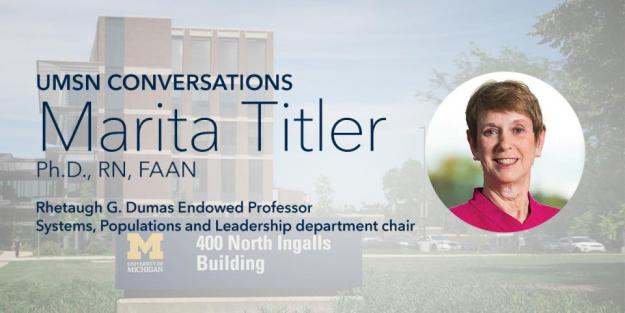Leadership insight: Q&A with Marita Titler

 Marita Titler, Chair, Department of Systems, Populations and Leadership, sat down with Jaime Meyers to discuss the wide-ranging responsibilities of a department chair and what drives her commitment to research.
Marita Titler, Chair, Department of Systems, Populations and Leadership, sat down with Jaime Meyers to discuss the wide-ranging responsibilities of a department chair and what drives her commitment to research.
Jaime Meyers (JM): What are the main elements of your role as Chair of the Department of Systems, Populations and Leadership?
Marita Titler (MT): Many of my responsibilities are focused on faculty—mentoring, development, annual reviews, input on promotions and tenure, and overall department leadership. There’s also research, grant applications and peer reviews for myself and the faculty. In addition to working with our existing faculty, I also spend time looking for the next great faculty members to join us, so recruitment and hiring is an essential component.
My student-focused work includes participating in the Ph.D. admission process, assignment of mentors, and working on enrichment activities.
JM: Tell us about your department, both the changes and the work its members do.
MT: Our programs of research are looking at health care system interventions to improve processes and outcomes of care, and addressing or testing interventions for different populations. The leadership component is educating people to lead in complex areas such as a large health systems and health agencies.
We have a number of faculty who use large data sets and use big data science methods to answer important questions that impact public policy. We also do research on safety including promoting healthy work environments.
A big area is getting health systems to use evidence in day-to-day care delivery to improve outcomes, known as implementation science. And not just in health systems, in populations, too. For example, how do you increase people having access to and using preventative health care services? That’s an area of great concern.
Our public policy arm, specifically with the health care legislation, has a lot of impact. What should be in the bill? Is health care a right or a privilege is an area we discuss with our students. We have researchers who look at the impact of new polices on the health of the nation.
JM: What are some of your most satisfying career accomplishments?
MT: My real passion is making a difference in health care for people and patients. If an investigator does a study and finds something that really works, the next phase is putting it into day-to-day practice—that’s really exciting and fulfilling to me.
I think the differences I’ve made in leading evidenced-based practice, long before it was a common, are important. I really am proud of the studies I’ve done in implementation science with older adults in both acute care and communities.
I’m also very proud of the Ph.D. students I’ve mentored and the careers they’ve gone on to forge.
JM: You have said you’re not a natural extrovert. How do you stay true to your personality while balancing a job that requires many interactions?
MT: It means I need to plan and have agendas. I start my day by doing a few hours of work at home. I like having that time to focus on my work. In the book, “Quiet,” they talk about the amount of energy it takes for people who are not natural extroverts compared to people who are. I enjoy one-on-one interactions or small gatherings, but if it’s a big party, I have to gauge my day so that I can attend. I like to take walks, read and spend time with my kids and grandkids to recharge.
JM: If being a nurse wasn’t an option, what would you do?
MT: Hmm, interesting. I would probably run a day care center with preschoolers.
JM: What’s an area of UMSN that you don’t interact with a lot, that would you want to learn about its function?
MT: I’d like to learn more about the development office. I think they probably do a lot of work that is invisible to us and I would like to understand that more.





